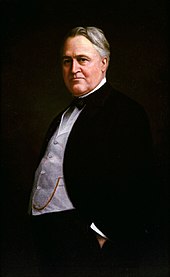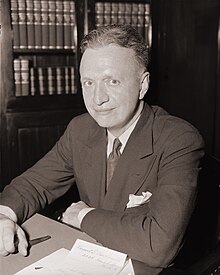The deep state in the United States is—according to a discredited conspiracy theory—a clandestine network of actors in the federal government, high-level finance and high-level industry that operates as a hidden government that exercises power alongside or within the legitimate, elected US government. Claims that such a "deep state" exists are conspiracy theories.
The claim that a deep state might exist has been dismissed by multiple scholars and authors. Political scientist Joseph Uscinski points out that "the concept has always been very popular among conspiracy theorists." Opinion polling from 2017 and 2018 suggests that approximately half of all Americans believe in the deep state. Whilst in office, now-former US President Donald Trump and various officials in his administration repeatedly referenced a so-called deep state and claimed it was working against Trump and his agenda.
Deep state and Donald Trump
2017
President Donald Trump's supporters use the term to refer to allegations that intelligence officers and executive branch officials guide policy through leaking or other internal means. According to a July 2017 report by the United States Senate Committee on Homeland Security and Governmental Affairs, "the Trump administration was being hit by national security leaks 'on a nearly daily basis' and at a far higher rate than its predecessors encountered". According to David Gergen, quoted in Time magazine, the term has been appropriated by Steve Bannon and Breitbart News and other supporters of the Trump Administration in order to delegitimize the critics of that presidency.
In May 2017, former Democratic U.S. Representative Dennis Kucinich stated in an interview on Fox News that a deep state within the bureaucracy was trying to destroy Trump's presidency. He further elaborated "The political process of the United States of America [is] under attack by intelligence agencies and individuals in those agencies...You have politicization of agencies that is resulting in leaks from anonymous, unknown people and the intention is to take down a president...Now this is very dangerous to America. It's a threat to our republic, it constitutes a clear and present danger to our way of life. So we have to be asking, what is the motive of these people? Who's putting these leaks out? Why doesn't somebody come forward and make a charge and put their name and reputation behind it, instead of attacking through the media and not substantiating their position?" In an interview several months earlier Kucinich said "What's at the core of this is an effort by some in the intelligence community to upend any positive relationship between the U.S. and Russia...There are people trying to separate the U.S. and Russia so this military-industrial-intel axis can cash in."
Trump and Steve Bannon, his former chief strategist, have both made allegations about a deep state which they believed was interfering with the president's agenda. In 2018, describing the deep state as an "entrenched bureaucracy", Trump accused the United States Department of Justice "of being part of the 'deep state'" in a statement advocating the prosecution of Huma Abedin. Some Trump allies and right-wing media outlets have alleged that former president Barack Obama is coordinating a deep state resistance to Trump. While the belief in a deep state is popular among Trump supporters, critics maintain that it has no basis in reality, arguing that the sources of the leaks frustrating the Trump administration lack the organizational depth of deep states in other countries. Critics also warned that use of the term in the U.S. could undermine confidence in vital institutions and be used to justify suppressing dissent.
2020
In February 2020, Trump cabinet member and acting White House Chief of Staff Mick Mulvaney, when asked if a deep state working against President Trump exists, stated that it was "absolutely, 100% true". In an article for The New York Review of Books, Michael Tomasky quoted Newt Gingrich as using the term in the context of the Robert Mueller investigation in July 2018, quoting Gingrich stating: "[Mueller is] ... the tip of the deep state spear aimed at destroying or at a minimum undermining and crippling the Trump presidency". Gingrich then added to the statement that "the brazen redefinition of Mueller's task tells you how arrogant the deep state is and how confident it is it can get away with anything".
Stephen Walt, professor of international relations at Harvard University, has written: "There's no secret conspiracy or deep state running U.S. foreign policy; to the extent that there is a bipartisan foreign-policy elite, it is hiding in plain sight."
The term has also been used in comments on the "deep state"-like influence allegedly wielded by career military officers such as H. R. McMaster, John Kelly and James Mattis in the Trump administration. The anthropologist C. August Elliott described this state of affairs as the emergence of a "shallow state": "an America where public servants now function as tugboats guiding the President's very leaky ship through the shallows and away from a potential shipwreck".
On September 5, 2018, The New York Times published an anonymous op-ed titled "I Am Part of the Resistance Inside the Trump Administration" written by a "senior official in the Trump Administration". In the essay, the official was critical of President Trump and claimed "that many of the senior officials in [Trump's] own administration are working diligently from within to frustrate parts of his agenda and his worst inclinations". House Minority Leader Kevin McCarthy described this as evidence of the deep state at work, and David Bossie wrote an op-ed at Fox News claiming this was the deep state "working against the will of the American people". However, there was some doubt as to the actual importance of the anonymous author, with some estimating that hundreds or thousands of possible positions could be considered "senior officials" and the inherent paradox of exposing the existence of such a group.
Polls
According to a poll of Americans in April 2017, about half (48%) thought there was a "deep state", defined as "military, intelligence and government officials who try to secretly manipulate government", while about a third (35%) of all participants thought it was a conspiracy theory and the remainder (17%) had no opinion. Of those who believe a "deep state" exists, more than half (58%) said it was a major problem, a net of 28% of those surveyed.
A March 2018 poll found most respondents (63%) were unfamiliar with the term "deep state", but a majority believe that a deep state likely exists in the United States when described as "a group of unelected government and military officials who secretly manipulate or direct national policy". Three-fourths (74%) of the respondents say that they believe this type of group probably (47%) or definitely (27%) exists in the federal government.
An October 2019 The Economist/YouGov poll found that, without giving a definition of "deep state" to respondents, 70% of Republicans, 38% of independents, and 13% of Democrats agreed that a "deep state" was "trying to overthrow Trump."
Statements and opinions about the deep state
- According to the journalist Robert F. Worth, "the expression deep state originated in Turkey in the 1990s, where the military colluded with drug traffickers and hitmen to wage a dirty war against Kurdish insurgents". The term "deep state" is likely a translation from the Turkish derin devlet (literally: "deep state" = "deep polity").
- In 2014, Bill Moyers, the former press secretary during the Johnson Administration, hosted a discussion on his PBS television show with a longterm congressional staff member examining the concept of a "deep state hiding in plain sight" that promotes military conflicts regardless of which party is in charge of the executive or legislative branches. Likewise in The Concealment of the State, political science professor Jason Royce Lindsey argues that even without a conspiratorial agenda, the term deep state is useful for understanding aspects of the national security establishment in developed countries, with emphasis on the United States. Lindsey writes that the deep state draws power from the national security and intelligence communities, a realm where secrecy is a source of power. Historian Alfred W. McCoy states that the increase in the power of the U.S. intelligence community since the September 11 attacks "has built a fourth branch of the U.S. government" that is "in many ways autonomous from the executive, and increasingly so."
- In a Foreign Affairs journal article and subsequent expansion in a law review, UCLA Law professor Jon D. Michaels rejects "the premise of an American deep state" in a defense of what he terms the 'administrative state' against Donald Trump's attempts to "deconstruct" it. Michaels argues that the concept of the 'deep state' is more relevant to developing governments such as Egypt, Pakistan and Turkey, "where shadowy elites in the military and government ministries have been known to countermand or simply defy democratic directives" than the United States "where governmental power structures are almost entirely transparent".
- Former NSA leaker Edward Snowden has used the term generally to refer to the influence of civil servants over elected officials: "the deep state is not just the intelligence agencies, it is really a way of referring to the career bureaucracy of government. These are officials who sit in powerful positions, who don't leave when presidents do, who watch presidents come and go ... they influence policy, they influence presidents."
- In an opinion piece by linguist Geoffrey Nunberg, he said the "deep state" is an "elastic label – depending on the occasion" and its "story conforms to the intricate grammar of those conspiracy narratives". He also contrasted the change in the "twin bogeys of conservative rhetoric", from bureaucratic "meddlesome bunglers" of "big government" to "conniving ideologues" who "orchestrates complex schemes".
- According to political scientist George Friedman, the Deep State has been in place since 1871 and continues beneath the federal government, controlling and frequently reshaping policies; in this view the U.S. civil service, was created to limit the power of the president. Prior to 1871, the president could select federal employees, all of whom served at the pleasure of the president. This is no longer the case.
- On March 20, 2018, Senator Rand Paul said "Absolutely there is a deep state because the deep state is the intelligence communities that do not have oversight." He continued, "There is no skeptic" [emphasis in original] among the four Republican and four Democratic Senators "who are supposedly" providing oversight, so that the intelligence communities, "with their enormous power ... have become a deep state." On December 4, 2018, Paul, in commenting on the CIA Director briefing only those eight Senators rather than the entire Senate, he added "Do you want to know what the deep state is? The CIA Director is coming to the U.S. Senate and only briefing a select few members of the Senate. Why shouldn't every senator know what is going on? The deep state wants to keep everyone in the dark. This is just ridiculous" On December 10, 2018, he said "The very definition of a 'deep state' is when the very people, congressional leaders – people who are elected by the people – are not allowed to hear the intelligence."
- Writing in a piece for the Moyers & Company website, John Light asserts that the term deep state "has been used for decades abroad to describe any network of entrenched government officials who function independently from elected politicians and work toward their own ends," but during the era of Trump the term has been twisted to mean "a sub rosa part of the liberal establishment, that crowd resistant to the reality TV star's insurgent candidacy all along."
- Michael Crowley, senior foreign affairs correspondent for Politico, wrote, "Beneath the politics of convenience is the reality that a large segment of the United States government really does operate without much transparency or public scrutiny, and has abused its awesome powers in myriad ways."
- Tufts University professor Michael J. Glennon claimed that President Barack Obama did not succeed in resisting and/or changing what he calls the "double government": the defense and national security network. Mike Lofgren felt Obama was pushed into the Afghanistan "surge" in 2009. Another major campaign promise Obama made was the closure of Guantanamo Bay Prison Camp, which he was unable to accomplish. This has been attributed indirectly to the influence of a deep state.
- Rolling Stone magazine quoted Fox News panelist Charles Krauthammer, who called the idea ridiculous, and summarized the Deep State concept this way: "Is there actually a deep state? If you mean entrenched bureaucracy, then of course there is. If you mean a government-wide conspiracy, then the answer is almost certainly no." Salon magazine traced Donald Trump's belief in a Deep State to conspiracy theorist Alex Jones of Infowars, who, it says, "believes that the government – a.k.a. the "deep state" – has orchestrated attacks and events throughout history. This includes the bombing of the Oklahoma City federal building, the massacre at Sandy Hook (he claims that many of the parents were actors), the Boston Marathon attack, and on and on," including believing that the 9/11 attack was "executed by the United States government." The magazine also points to Trump's long-time ally, Roger Stone, as an influence. Stone has written several books which center on conspiracy theories, and blames Lyndon Johnson for the death of President John F. Kennedy, and alleges that Ted Cruz's father was involved in that assassination.
In his book The State: Past, Present, Future, Bob Jessop notes the similarity of three constructs:
- 'Deep state' – for which he cites Mike Lofgren's 2014 definition: "a hybrid association of elements of government and parts of top-level finance and industry that is effectively able to govern ... without reference to the consent of the governed as expressed through the formal political process".
- 'Dark state' – "networks of officials, private firms, media outlets, think tanks, foundations, NGOs, interest groups, and other forces that attend to the needs of capital, not of everyday life" while "concealed from public gaze" (or "hidden in plain sight"), citing Jason Lindsay (2013).
- 'The Fourth Branch' of U.S. government – consisting of "an ever more unchecked and unaccountable centre ..., working behind a veil of secrecy", citing Tom Engelhardt (2014).
The term "deep state" has been associated with the "military–industrial complex" by Mike Lofgren, who has identified this complex as the private part of the deep state. However, Marc Ambinder has suggested that a myth about the "deep state" is that it functions as one entity; in reality, he states, "the deep state contains multitudes, and they are often at odds with one another."








